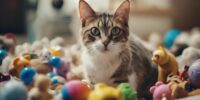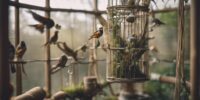Ocicat: the Wild Look With a Domestic Heart
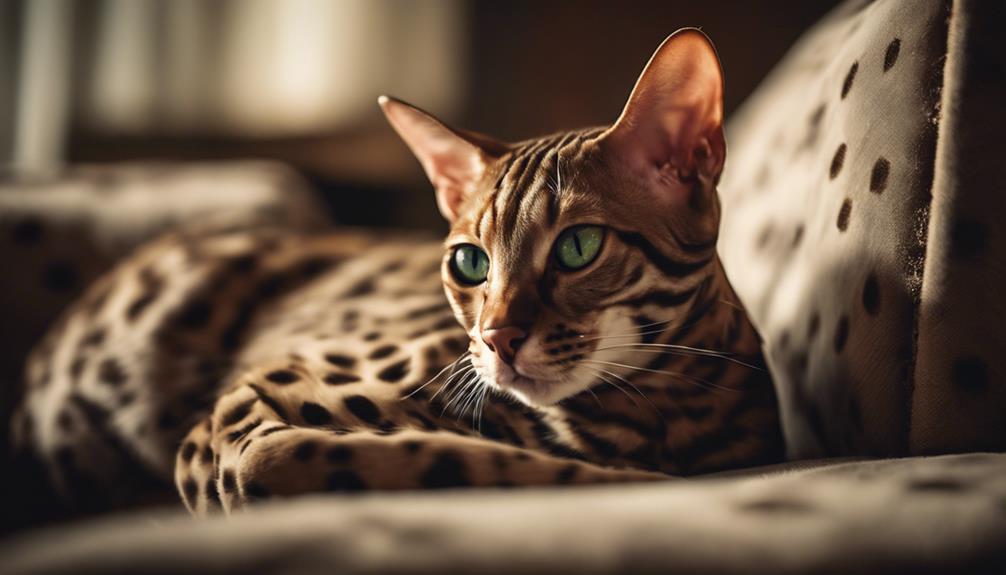
The Ocicat is a captivating breed that blends wild beauty with domestic charm. It is known for its intelligence, playfulness, and affectionate nature.
The Ocicat stands out for its striking appearance, resembling a wild ocelot but with a loving and social temperament.
Ocicat – Origins and History
Developed in the 1960s by Virginia Daly, the first Ocicat named Tonga was accidentally created, marking the origins of this unique and striking breed.
The Ocicat, though reminiscent of a wild Ocelot in appearance, is a domestic cat breed that has captured the hearts of many. Its history traces back to careful breeding efforts that combined Abyssinian, Siamese, and American Shorthair breeds, resulting in the distinctive physical characteristics that define the Ocicat today.
Recognized by major cat associations in the 1980s, the Ocicat quickly gained popularity for its wild look coupled with a friendly and sociable temperament, making it a sought-after companion for cat enthusiasts worldwide.
The breed's intelligent nature, muscular build, and captivating coat patterns have further solidified its place as a unique and engaging feline companion, showcasing a blend of the wild and the domestic in a single captivating package.
Ocicat – Unique Physical Characteristics
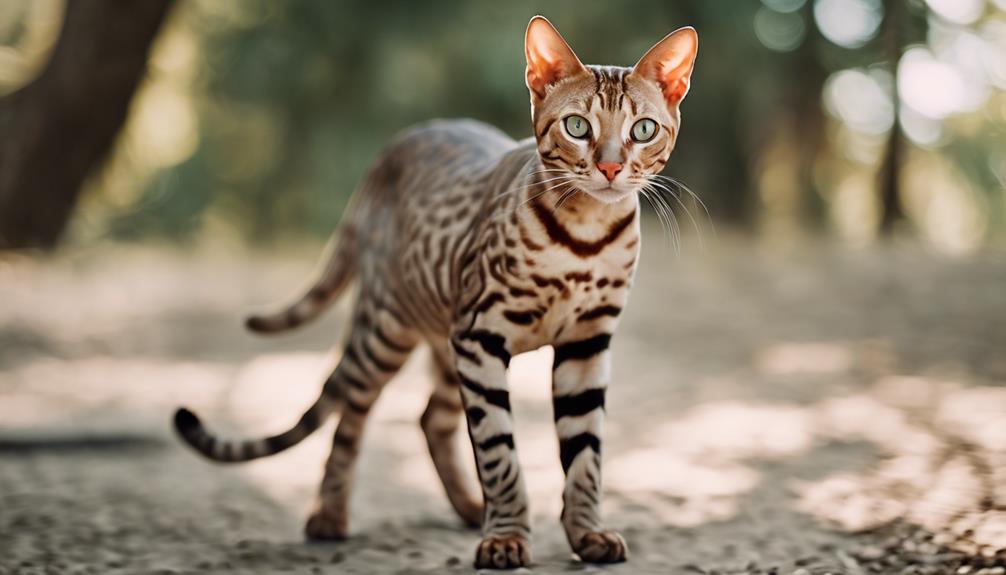
The unique physical characteristics of the Ocicat set it apart as a breed that embodies the untamed beauty of its wild ancestors while retaining a domestic heart. Ocicats showcase distinctive coat patterns that include spots and stripes, reminiscent of their wild relatives. Their coat colors span a wide range from tawny, chocolate, to blue, with a total of 12 different variations. These felines are larger than typical house cats, with males reaching weights of up to 15 pounds. Their almond-shaped eyes and wedge-shaped heads contribute to their unique and alert appearance, further enhancing their wild look. Additionally, Ocicats boast well-muscled, athletic bodies that give them a sleek and shiny coat, accentuating their wild yet domestic charm.
| Physical Characteristics | |
|---|---|
| Coat Patterns | Spots and Stripes |
| Coat Colors | Tawny, Chocolate, Blue |
| Distinct Features | Almond-Shaped Eyes, Athletic Build |
Ocicat – Friendly and Affectionate Nature
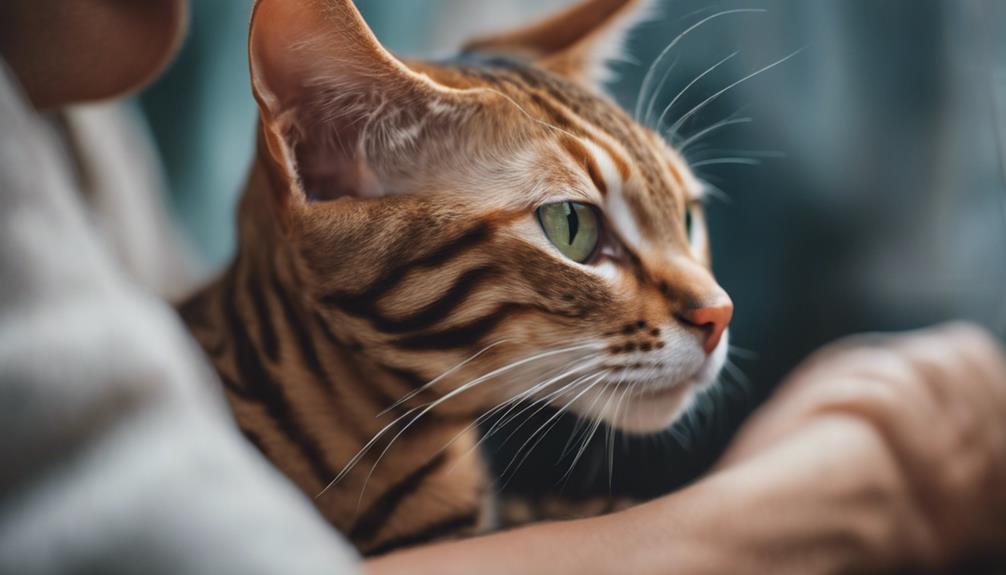
Displaying a warm and sociable demeanor, the Ocicat charms with its friendly and affectionate nature. This breed is known for forming strong bonds with its owners, making them ideal companions for families seeking a loyal pet. Here are some key points highlighting the Ocicat's friendly and affectionate nature:
- Social Butterflies: Ocicats are social creatures that thrive on interaction. They enjoy being involved in household activities and love spending time with both humans and other pets in the household.
- Intelligent Companions: With their high level of intelligence, Ocicats are quick learners and enjoy mental stimulation. They're curious by nature and always eager to learn new tricks and skills.
- Stable Temperament: Known for their stable temperament, Ocicats have an outgoing and playful nature. They make wonderful pets for those seeking a lively companion that can bring joy and entertainment to their homes.
Ocicat – Playful and Curious Personality

The Ocicat's playful and curious personality is a standout trait among feline companions, ensuring constant entertainment for their owners.
Their energetic playfulness and insatiable curiosity drive them to explore their surroundings and engage in interactive activities.
These qualities make Ocicats not only intelligent and trainable but also incredibly fun and engaging pets in any household.
Energetic Playfulness of Ocicats
With their boundless energy and inquisitive nature, Ocicats exude a playful charm that captivates those around them. These feline companions are always ready for interactive games and activities, making them a joy to have in any household.
Their curious nature drives them to explore their environment with enthusiasm and interest, keeping their owners entertained with their playful antics. Ocicats thrive on mental stimulation through toys and puzzles, ensuring they stay engaged and happy.
Families with children will find Ocicats to be ideal pets, as they provide endless opportunities for interactive play that not only entertains but also strengthens the bond between the cat and their human family members.
Curiosity Drives Ocicats
Ocicats' insatiable curiosity serves as the driving force behind their playful and engaging personalities, propelling them to explore, interact, and learn with boundless enthusiasm. These intelligent felines thrive on interactive play, enjoying games that challenge their minds and bodies. Their social nature makes them eager to participate in household activities and bond with their human companions. Ocicats' stable temperament ensures they remain friendly and approachable, even in novel situations. Their playful and curious demeanor makes them ideal pets for families seeking an interactive and engaging companion. Below is a table highlighting key traits of Ocicats:
| Trait | Description |
|---|---|
| Playful | Enjoys interactive games |
| Curious | Insatiable desire to explore |
| Intelligent | Thrives on mental stimulation |
Ocicat – Health and Care Considerations

Ocicats require diligent attention to their health needs, as they may be predisposed to conditions like liver or renal amyloidosis and hypertrophic cardiomyopathy. Regular veterinary check-ups play a crucial role in ensuring the well-being of these unique felines.
Proper dental care and a balanced diet tailored to their specific requirements can help prevent common health issues and promote a long, healthy life for Ocicats.
Health Considerations Overview
Regular health check-ups are essential for monitoring potential health issues and ensuring the well-being of Ocicats, given their susceptibility to various conditions such as liver or renal amyloidosis, hypertrophic cardiomyopathy, dental problems, and genetic disorders like pyruvate kinase deficiency.
- Liver or Renal Amyloidosis: A condition where amyloid protein accumulates in organs like the liver or kidneys.
- Hypertrophic Cardiomyopathy (HCM): Common heart condition in Ocicats that can lead to heart failure if not managed.
- Dental Care: Crucial for Ocicats due to susceptibility to periodontal or gum disease if oral hygiene is neglected.
Regular veterinary check-ups are recommended to monitor for these issues and ensure the Ocicat's health and happiness.
Care Tips and Tricks
For optimal health and well-being, maintaining a consistent grooming routine is essential for the care of Ocicats. Due to their short coat and moderate shedding, ocicats require regular grooming to keep their fur in top condition. Nail trimming is also important to prevent overgrowth and potential issues.
It's recommended to provide ocicats with an indoor lifestyle to ensure their safety and overall well-being. These cats enjoy mental stimulation, so incorporating clicker training can be a fun and rewarding activity for both the cat and the owner.
Additionally, consulting a veterinarian for dietary advice, focusing on species-appropriate and grain-free diets, is crucial for the optimal health of ocicats.
Common Health Issues
Prone to various health issues, the Ocicat requires careful monitoring and proactive care to maintain its well-being and longevity. Ocicats may be susceptible to liver or renal amyloidosis, where amyloid protein deposits can impact organ function.
Additionally, hypertrophic cardiomyopathy (HCM) is a common heart condition in Ocicats, potentially leading to heart failure if left untreated. Dental problems, such as periodontal disease, can also affect Ocicats, emphasizing the importance of dental care and regular veterinary check-ups.
Furthermore, genetic conditions like pyruvate kinase (PK) deficiency can cause anemia in Ocicats, necessitating close monitoring and appropriate care. Regular veterinary check-ups are crucial for early detection and management of potential health issues in Ocicats.
Ocicat – Fun Facts and Quirks
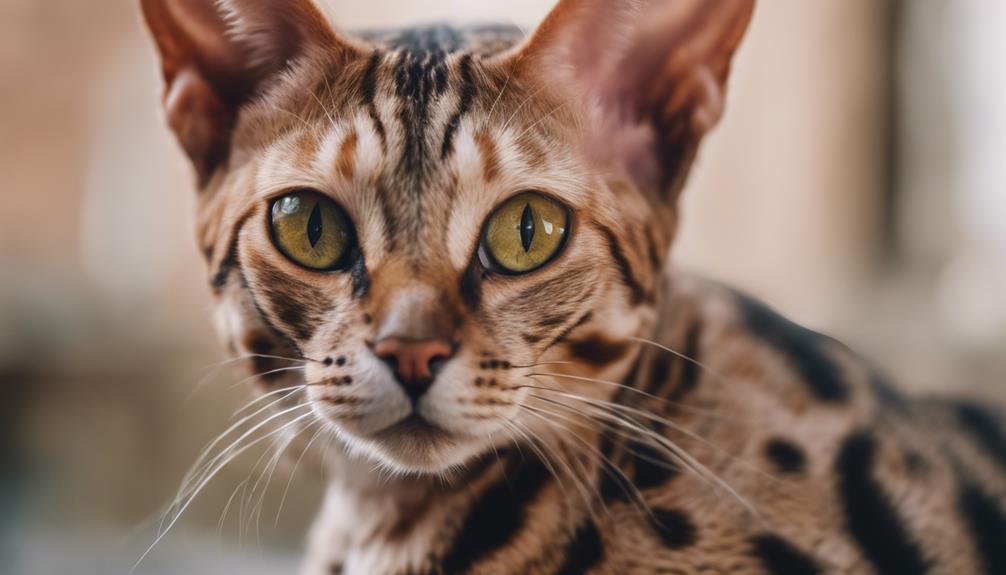
Known for their unique resemblance to wild cats, Ocicats are often referred to as the 'Lap Leopard' among feline enthusiasts. These striking felines have a lifespan of 15 to 18 years, offering long-lasting companionship to their owners. While Ocicats are generally healthy, they can be prone to genetic conditions like amyloidosis and dental issues, emphasizing the importance of regular veterinary care.
One of the most endearing qualities of Ocicats is their playful and curious nature. Their high level of intelligence makes them interactive and trainable, delighting those who enjoy engaging with their pets. Additionally, Ocicats boast distinct coat patterns and colors that make them stand out as unique and captivating feline companions. Whether they're pouncing on toys or showing off their agility, Ocicats never fail to entertain and charm those around them.
Ocicat – Popularity and Recognition

With their distinctive appearance and friendly demeanor, Ocicats have garnered widespread recognition and popularity within the cat community. These cats aren't only visually striking but also known for their amiable nature, making them beloved companions for many.
Here are some key points regarding the popularity and recognition of Ocicats:
- Ocicats are recognized by major cat associations such as the CFA and TICA, solidifying their status as a reputable and established breed in the feline world.
- They've a steady and growing fan base due to their unique appearance and friendly nature, attracting cat enthusiasts who appreciate their individuality and sociable temperament.
- Ocicats are often featured in advertisements and films, showcasing their popularity and appeal to a wider audience beyond dedicated cat lovers.
The breed's ability to combine a wild look with a domestic heart has captured the attention of many, contributing to their rising popularity as sought-after pets globally.
Frequently Asked Questions
What Is the Wild Cat That Looks Like a Housecat?
A wild cat that looks like a housecat is an Ocicat. Known for its wild appearance, domestic temperament, unique markings, energetic personality, playful nature, and affectionate breed, the Ocicat originates from an exotic lineage.
What Are the Cons of Ocicat?
When considering an Ocicat, potential owners should be aware of the breed's high energy levels, moderate grooming needs, playful behavioral quirks, training challenges due to their intelligence, potential health concerns, preference for ample space, and active play preferences.
How Do You Tell if My Cat Is an Ocicat?
To tell if a cat is an Ocicat, look for brown or gold thumb-shaped spots, short coat with distinct markings, medium to large size, wedge-shaped head, almond eyes, and sociable, playful behavior. Ocicats require proper care, attention to health, and reputable breeders.
How Much Does a Ocicat Cat Cost?
The price range of an Ocicat cat can vary from $800 to $2,500, influenced by factors like breeder reputation and coat patterns. Adoption from shelters may offer lower costs. Consider care expenses, health considerations, and personality traits when owning an Ocicat.

